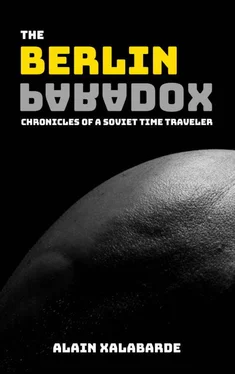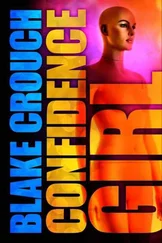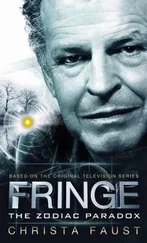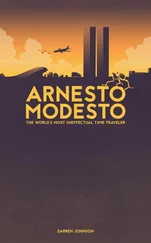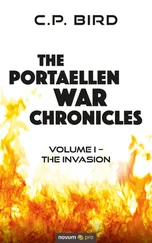The lab seems to be among the smaller ones. It doesn’t take us too long before we reach the time booth. Burak takes his notebook out once more. He opens a fuse box and turns the switches on. I am amazed to see the lights turn on, after all these years. I ask Burak about it, but he says they still weren’t able to figure out where the power source comes from.
After about an hour, I am standing naked inside the booth. Burak seems a little confused by the instructions in the notebook. This doesn’t comfort me. I patiently watch him through the porthole. He paces up and down the room, with the notebook always in his hand. He finally gives me the thumbs up and the machine starts its cycle. He smiles awkwardly through the porthole. I begin to feel a little dizzy. Burak’s smile quickly fades and he turns around as if hearing something. I can’t hear anything from inside the booth. But I do see someone enter the room. Who the hell is that? It’s too dark to make out who it is. The stranger holds up a gun and without hesitation fires a round straight to Burak’s chest. I push against the booth’s door in desperation, but it’s too late. I’m somewhen else.
I rush to open the door of the time booth, hoping that I’ll somehow be on time to save Burak, but it is a totally different room. Unsurprisingly, it is dark. Unlike the other locations, however, there is a nauseating odor burning through my nostrils. I extend my arms and try to reach for any sort of solid surface. I find a table, but there’s nothing of value on it. I walk towards the exit and my foot stumbles upon something soft on the floor. I squat down and I let my eyes adjust to the darkness. The stench is stronger, deeper. Finally I see it. A rotting human body. I jump to my feet and take two steps back. The corpse is unrecognizable. It has been here for quite a long time. All I can tell is that it is completely naked and hairless. For a moment I feel the panic take over me as a thought drops into my head. Is it me? I try to make sense of it. How could it be? Will I die later? Will I die now? How can there be two dead instances of myself? My thoughts are interrupted by a loud explosion.
I duck and crouch towards the nearest corner. I wait. My ears are ringing and it is hard to make out any sounds, but after a few moments I begin to hear footsteps. I hope it is Burak.
The steps slow down as they approach the room I’m in. The beam from a flashlight floods the interior of the room, blinding me. A black, tall silhouette enters the room. The man says my name. His voice is familiar.
He flashes the light directly into me and I use my hands to cover my face. He takes a step towards me and I now discern that he is holding a gun in the other hand. He points it straight at me and bang! The dark figure is shot in the head. The flashlight drops from his hand and rolls towards me. A second man enters, also holding a gun and a flashlight. I point the flashlight at my father’s face. He turns away from the light. I point my beam to the freshly dead body on the floor. To my surprise, it is also my father. A younger version.
The beam of light flickers as my hand trembles in panic. My father asks me to calm down. I can’t. He walks towards me, slowly. His voice is soothing. He puts his gun back in his holster and assures me that he means no harm.
He begins to undress himself — that is, his now dead version of himself. He takes away his gun and asks me to put on his clothes. Without much of a choice, I go along. I only have a moment, but I notice strange markings on the dead man’s naked skin. It’s hard to tell what they are in the darkness.
Only moments later we walk towards the exit, which is actually just a huge hole left by the explosion I heard earlier. It still smells of burned explosives.
Once outside, it seems to me that we are in the middle of nowhere. It is early morning, and very cold. We are on a small island in what seems to be a lake. On the other side of the water, a mass of trees. I follow my father, my murderous father, still distrustful. I quickly notice airplanes flying over us at a very low altitude. I suppose we’re near an airport but I still can’t tell which one.
A small rowboat is waiting for us in the water. He asks me to hurry up. We both jump on it and he quickly rows away to shore. Moments later, we get off, run through some trees and reach an old Goggomobil behind some bushes. We get in and he drives off in a hurry.
On our way we pass by, what I recognize as, Tegel airport. To my surprise, we do not drive towards the center of Berlin. Instead my father continues towards Spandau. During my whole time in Berlin, I’ve never come to Spandau. It’s funny how you always end up circling the same streets, oblivious to all the beautiful spots in the peripheral areas.
I imagine we’re passing by the citadel. Of course, my father has no time to stop. In some strange way it feels like an excursion I never had when I was a child.
Minutes later my father parks the car and I follow him to an apartment block. He rings the intercom. Someone picks up, but no voice is heard. The door buzzes and we enter the complex. We go up the stairs and a fat man is waiting for us with the door open. He gestures us to hurry up and get inside.
There is an uncomfortable aura in the apartment. Something seems odd, but I can put my finger on it. The fat man nods at my dad, glances at me and leaves us. My father guides me to what I suppose is his bedroom. He takes his jacket off and hangs it inside the wardrobe. He asks me to hang my jacket too. I walk up to him and do it myself. On the top shelf I notice a suspicious, big metal box. I choose to ignore it for now. I still need to regain consciousness and think of what just happened.
I try to speak with my father but he places his finger over his mouth. He whispers. Apparently it’s not a safe place to talk.
We exit the room and walk to the kitchen. While my father looks for a jar of salt, he suggests I grab a teaspoon. I open the drawer and shuffle through the cutlery. A couple of pieces catch my attention. I grab a teaspoon and bring it close to my face. On the back I find an engraved swastika. My father hands me the jar of salt. I eat a couple of spoonfuls before I realize I’m putting a nazi spoon in my mouth.
My father stares at me while I eat salt. But, rather than watching, he seems to be studying me. When I think I’ve had enough, I hand over the jar. He puts it away and I drop the spoon in the sink.
He gives me a moment to breathe and then suggests we go outside for a walk.
Outside, the weather is getting warmer. My dad and I stroll calmly through a nearby park, as if this morning never happened. I tell myself that I should be afraid, but I am not.
His bland head shines in the sun as he marches forward, looking down at his feet with every step. We’ve been walking for quite a while now and he still hasn’t said a word. I’d usually wait for others speak first in these sort of situations, but I can’t help myself from demanding explanations.
He sits on the nearest bench, but I choose to stand instead. He stretches his arms across the length of the bench and avoids eye contact with me. I ask why he killed the other man at the bunker. He answers that he wanted to kill me. By ‘he’, he means himself. He explains that a younger version of himself was determined to put an end to my life. He collaborated with himself to find me only to put a bullet in his head in the last moment.
I ask him if he’s not concerned about the time rupture he may have created by killing a younger version of himself. He doesn’t answer. I attempt to explain as properly as I can what Dr. Vodnik said to me days ago — or rather years ago. My father chuckles. He undermines the Russian’s understanding of the whole time program and clarifies the reality of the time paradox. Once you travel, you have no link whatsoever to any previous point in time. The new instance of yourself is now existing wholly, exclusively in this time and space. You become a lone singularity that cannot be influenced by former instances of yourself. The only things that may change are those which stay in the aforementioned times and spaces. All that remains is what influences the outcome of history. For instance, if you destroy a building, that building will not exist in the future. But if you travel to the past and kill yourself, your living instance will continue living, as it is already there, independent of whatever happens in the future.
Читать дальше
